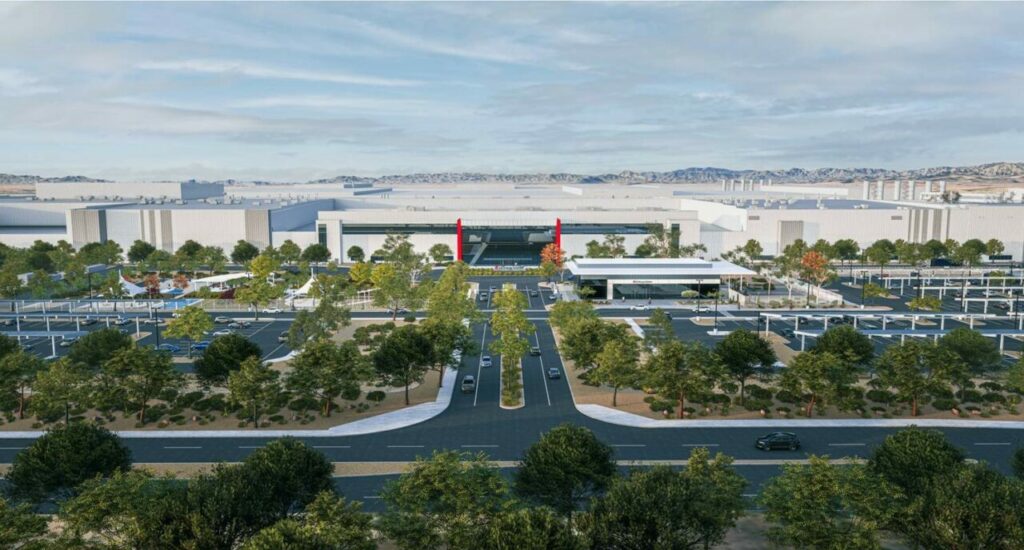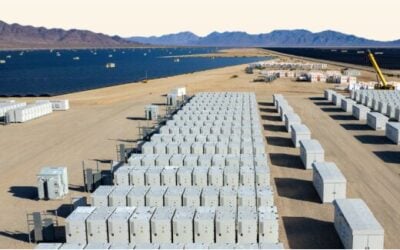
Battery manufacturer LG Energy Solution has started construction on its gigafactory in Arizona, US, which will have 17GWh of production dedicated to the energy storage system (ESS) market.
Work started on-site in November 2023 for commissioning in 2026, the South Korea-headquartered firm said today (4 April), following a stakeholder meeting earlier in the week. Initial land preparations are complete and steel beams are being placed at the site.
At full manufacturing capacity, the new facility will produce 36GWh of cylindrical 46-Series batteries for electric vehicles (EVs) and 17GWh of pouch-type lithium iron phosphate (LFP) batteries for the ESS market, totalling a combined capacity of 53GWh.
The company claimed the ESS facility, called LG Energy Solution Arizona ESS, will be “one of the first ESS-exclusive battery production facilities in the world”. Full-scale recruitment will be begin in the second half of 2025.
Try Premium for just $1
- Full premium access for the first month at only $1
- Converts to an annual rate after 30 days unless cancelled
- Cancel anytime during the trial period
Premium Benefits
- Expert industry analysis and interviews
- Digital access to PV Tech Power journal
- Exclusive event discounts
Or get the full Premium subscription right away
Or continue reading this article for free
Hyung Kim, head of the ESS battery division, commented: “There is no better place to build the source of our sustainable energy here in Arizona, where the abundant solar energy surrounds the region. Quality batteries, made right here in the Copper State, will reach every corner of America to provide power.”
Another executive at the division, Seungse Chang, spoke to Energy-Storage.news at the RE+ clean energy trade event in California in September last year about the company’s US market strategy (Premium).
Incentives under the Inflation Reduction Act (IRA) provide significant support for domestic clean energy technology manufacturing, via an array of tax credits.
These include the 45X tax credit, which pays per unit of product produced – US$35 per kWh for battery cells – another paying US$10 per kWh of battery modules produced, and a tax credit for upfront investment, the 48C. There is also a US$7,500 tax credit claimable by the end-user for EVs with batteries containing a minimum content of domestically-sourced components.
Similarly, on the downstream side, there is a 10% domestic content tax credit adder to the 48E tax credit for downstream energy storage project deployment, although delegates at Solar Media’s Energy Storage Summit (ESS) USA 2024 last month said clarity was still needed on how to benefit from it.
Our Next Energy eyes IRA-compliant cathode material via partnership
In related US upstream battery news, US gigafactory startup Our Next Energy (ONE) has signed a memorandum of understanding (MOU) with South Korean company L&F to explore the potential of producing cathode active materials (CAM) for batteries that comply with IRA incentives. CAM is used to create the battery cathode, a critical part of the battery cell.
The announcement said that L&F is exploring potential opportunities for future expansion to North America, while also exploring IRA-compliant materials for use in US-made battery cells.
It could therefore either look to manufacture CAM in the US itself, or continue to manufacture it in South Korea, using source metals and minerals sourced from select countries that the US has a free trade agreement (FTA) with. This, provided the materials meet a certain minimum content, would allow those batteries to qualify for the US$7,500 EV battery tax credit.
ONE plans to manufacture batteries for both EVs and ESS, and recently agreed to sell batteries to the ESS arm of General Electric.





